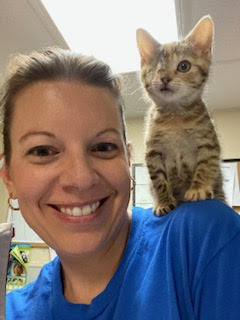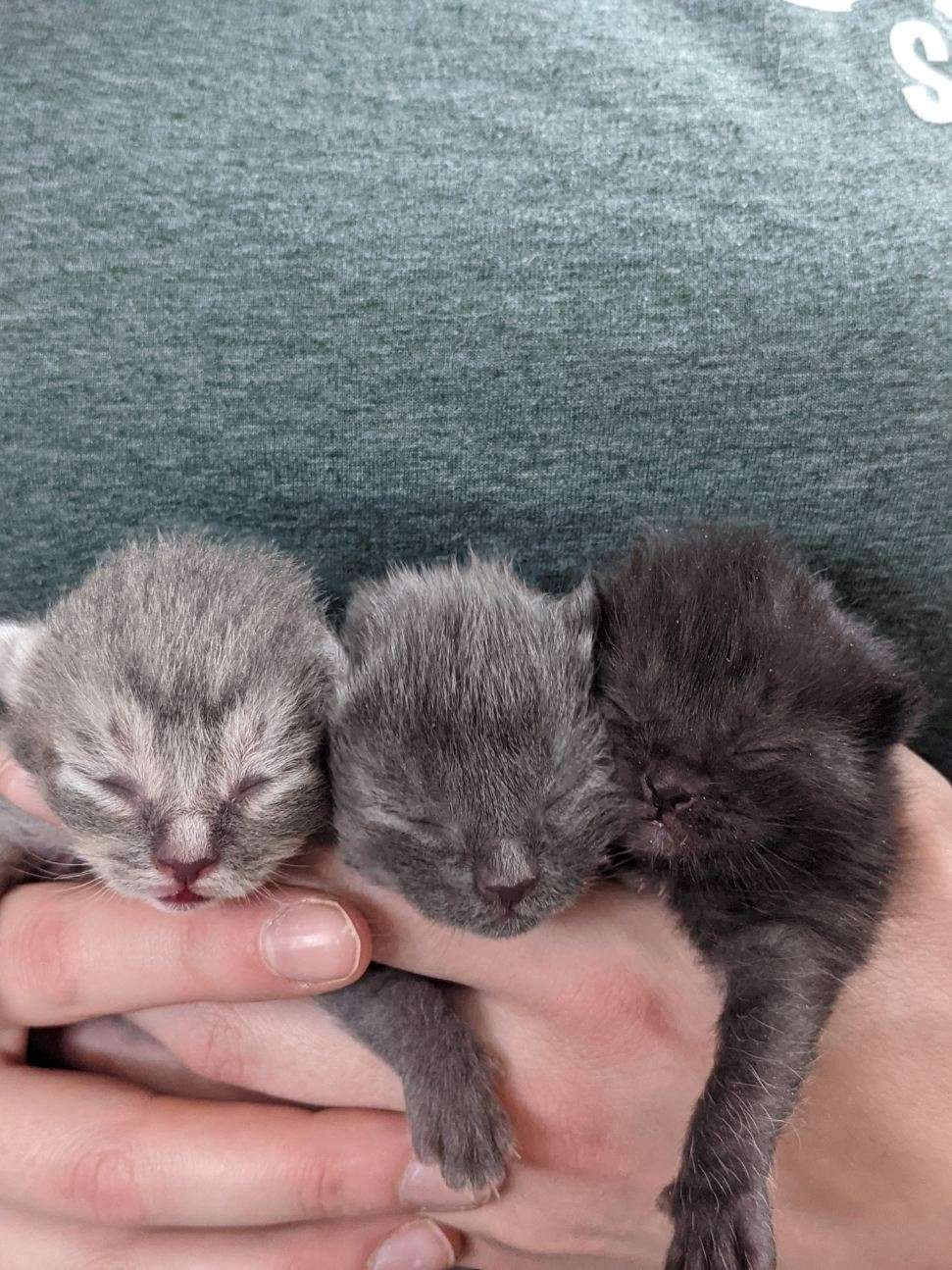 Vanessa Parks, the AWLA's Kitten College Intake Coordinator, pauses to take a picture with Annie -- a graduate of the Kitten College who soon after went on to find her forever home.
Vanessa Parks, the AWLA's Kitten College Intake Coordinator, pauses to take a picture with Annie -- a graduate of the Kitten College who soon after went on to find her forever home.
These newborn kittens are just like human babies: they need their mothers to nurse them, care for them, and protect them until they are mature enough to fend for themselves. Neonatal kittens are at severe risk if they are orphaned.
Abandoned infant kittens are actually the most euthanized animals across the country.
According to Marnie Russ, the Program Administrator for the Animal Welfare League of Arlington’s Kitten College, euthanasia is a common approach because these underdeveloped kittens often just require too much time, effort and resources for the majority of shelters that are already over capacity and pushed to their limits.
“While healthy kittens are some of the most adopted animals in shelters across the country, neonatal kittens in shelters who are not ready for adoption require a lot of resources that many shelters do not have,” Russ said. “Unfortunately, in these cases, euthanasia is a shelter’s only – and usually most humane – option.”
Especially during the summer feline breeding season, shelters are flooded with abandoned neonatal kittens who simply cannot survive without constant, intense support until they are ready for adoption.
In 2016, the AWLA team pursued a life-saving opportunity for these kittens: they teamed up with the National Kitten Coalition – a national non-profit organization that sets out to increase the survival rates of these tiny kittens.
 Three newborn kittens who all practically fit into the palm of one human hand, landed at the AWLA before even opening their eyes, which typically occurs at seven to ten days after birth.
Three newborn kittens who all practically fit into the palm of one human hand, landed at the AWLA before even opening their eyes, which typically occurs at seven to ten days after birth.
Leveraging the expertise of the National Kitten Coalition, the AWLA team devised a plan for creating a kitten nursery in Arlington. They also formed an education and outreach program for other local shelters so that they too could establish such nurseries.
According to the Best Friends Animal Society, kitten nurseries are areas within, or associated with, shelters where “very young kittens receive the time and care they need to grow big enough to be spayed or neutered and adopted. That process requires eight to nine weeks of intensive care … [as well as] staff and volunteers ready to care for kittens 24 hours a day.”
The AWLA’s partnership with the National Kitten Coalition had Russ traveling around the country to meet with the few large-scale kitten nurseries that exist across the country.
“As I sat in these meetings with these large-scale, established kitten nurseries, we saw the amazing things that these nurseries were doing,” Russ said. “But, at the same time, I wondered how it would all work at a mid-sized municipal shelter [like the AWLA], where most animals end up.”
She thought, shouldn’t there be hope and options for kittens everywhere, and not just in the areas with major kitten nurseries?
The knowledge that Russ brought back was crucial because, until the AWLA established its own kitten nursery, most mid-sized shelters in the area did not even have plans for forming these life-saving operations.
In 2017, the AWLA officially launched its own kitten nursery, called the Kitten College. It is staffed with volunteer foster caretakers who, after extensive training by AWLA professionals, take these kittens into their homes and care for them around the clock until they are ready for adoption.
“We call our nursery the Kitten College,” Russ said. “It is a ‘college’ based on the ages that the foster parents are comfortable caring for kittens. For example, tiny bottle-fed babies are cared for by our senior-most experienced fosters, and our freshman fosters will take in two pound kittens waiting for their sterilization surgeries.”
The Kitten College has given so many otherwise doomed neonatal kittens a chance to have normal, happy lives. And, AWLA recognizes that these life-changing results wouldn’t be possible without their fosters.
“We trained an entire army of foster families to care for these kittens until they were ready for adoption,” Russ said. “Prior to establishing our nursery, we had about 30 foster families, and today we have more than 250 foster families. These amazing people are the reason we have been such a huge success. Their love and commitment to caring for these kittens drives us every day as the program continues to grow.”
The year before AWLA’s Kitten College was established, the organization took in 92 neonatal kittens. Then, the next year – the Kitten College’s first year – AWLA rescued 367 neonatal kittens. The Kitten College has exploded so much that in 2020, the same program saved 1,518 neonatal kittens.
The explosive growth also made it essential for the AWLA to bring on a full-time employee, Vanessa Parks, as the Kitten College Intake Coordinator to run the operation.
“When I was first asked to come aboard in 2018 and work with Marnie, I was thinking, ‘Okay, this will be nice to get a nice part-time job working at the animal shelter,’” Parks said. “Little did I know, it became a full-time career that I absolutely love. Now I can't imagine working less than 50 hours a week keeping all foster parents and kittens in line.”
Now that the Kitten College is up, running, and growing, the AWLA team’s next step has been to spread their knowledge to, and inspire other mid-sized municipal shelters to set up kitten nurseries.
To spread awareness of kitten nurseries and to lend support, the Kitten College now has eight satellite campuses which Russ explained are “regional shelters who have struggled with the care of underage kittens.”
And now, because of Parks and Russ, these satellite campuses – all in Maryland and Virginia – are building out their own kitten nurseries and related programs.
“We are offering them whatever resources they may need and guiding them through the process,” Parks said. “Our strategy is to target the areas where we have pulled a lot of kittens from over the last three years in the hopes that the shelters in these areas will soon be able to perform this life-saving work on their own.”
While Parks finds her work beyond fulfilling, she hopes that one day, there will be an easier way to give neonatal kittens the happy, healthy lives that they deserve.
“I am so excited to see what happens in the next few years,” she said. “Of course the goal is always for me to be out of a job, but sadly that may never happen. However, I am confident that other shelters and rescues will learn they can help the kittens in the same way we do. And, for the record, I’m always looking to grow the foster network and teach new foster families how to bottle feed and care for the babies. The more fosters we have, the more kittens we are able to save.”
To volunteer or find out more about AWLA’s Kitten College, see https://www.awla.org/programs/kitten-college.